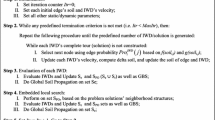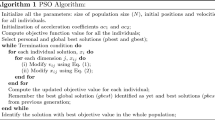Abstract
This article studies a uniform parallel machine scheduling problem with unequal job release times. It is assumed that each machine consumes a certain non-renewable resource when manufacturing jobs. The objective is to find an optimal schedule to minimize the makespan, given that the total resource consumption does not exceed the given limit. A mathematical model is first built to derive optimal solutions for small-scale instances. For large-scale instances, a simplified swarm optimization (SSO) algorithm is proposed. Considering that the parameters of meta-heuristic algorithms have great impacts on the output solution, the Taguchi method is then applied to tune the algorithm parameters. Afterward, a large number of simulation experiments are conducted. Finally, Friedman’s test and Wilcoxon signed-rank test are employed to analyze the simulation results from statistical perspectives. Experimental results reveal that the proposed algorithm can provide competitive solutions.






Similar content being viewed by others
Availability of data and materials
Not applicable.
Code availability
Once the article is published, the relevant source code will be freely available.
References
Abd K, Abhary K, Marian R (2016) Multi-objective optimisation of dynamic scheduling in robotic flexible assembly cells via fuzzy-based Taguchi approach. Comput Ind Eng 99:250–259
Afzalirad M, Rezaeian J (2016) Resource-constrained unrelated parallel machine scheduling problem with sequence dependent setup times, precedence constraints and machine eligibility restrictions. Comput Ind Eng 98:40–52
Al-Harkan IM, Qamhan AA (2019) Optimize unrelated parallel machines scheduling problems with multiple limited additional resources, sequence-dependent setup times and release date constraints. IEEE Access 7:171533–171547
Alidaee B, Ahmadian A (1993) Two parallel machine sequencing problems involving controllable job processing times. Eur J Oper Res 70(3):335–341
Azadeh A, Elahi S, Farahani MH et al (2017) A genetic algorithm-Taguchi based approach to inventory routing problem of a single perishable product with transshipment. Comput Ind Eng 104:124–133
Balin S (2011) Parallel machine scheduling with fuzzy processing times using a robust genetic algorithm and simulation. Inf Sci 181(17):3551–3569
Blazewicz J, Ecker KH, Pesch E, et al (2019) Handbook on scheduling: from theory to practice. Springer
Chen B, Vestjens APA (1997) Scheduling on identical machines: How good is lpt in an on-line setting? Oper Res Lett 21(4):165–169
Chen R, Yang B, Li S et al (2020) A self-learning genetic algorithm based on reinforcement learning for flexible job-shop scheduling problem. Comput Ind Eng 149:1–12
Cui WW, Lu Z (2017) Minimizing the makespan on a single machine with flexible maintenances and jobs’ release dates. Comput Oper Res 80:11–22
Durasević M, Jakobović D (2023) Heuristic and metaheuristic methods for the parallel unrelated machines scheduling problem: a survey. Artif Intell Rev 56:3181–3289
Edis EB, Oguz C, Ozkarahan I (2013) Parallel machine scheduling with additional resources: notation, classification, models and solution methods. Eur J Oper Res 230(3):449–463
Gharbi A, Haouari M (2002) Minimizing makespan on parallel machines subject to release dates and delivery times. J Sched 5(4):329–355
Graham RL, Lawler EL, Lenstra JK et al (1979) Optimization and approximation in deterministic sequencing and scheduling: a survey. Ann Discret Math 5:287–326
Gusfield D (1984) Bounds for Naive multiple machine scheduling with release times and deadlines. J Algorithms 5(1):1–6
Györgyi P, Kis T (2017) Approximation schemes for parallel machine scheduling with non-renewable resources. Eur J Oper Res 258(1):113–123
Hajiaghaei-Keshteli M, Aminnayeri M, Fatemi Ghomi SMT (2014) Integrated scheduling of production and rail transportation. Comput Ind Eng 74:240–256
Huang CL (2015) A particle-based simplified swarm optimization algorithm for reliability redundancy allocation problems. Reliab Eng Syst Saf 142:221–230
Johnson SM (1954) Optimal two-and three-stage production schedules with setup times included. Nav Res Logist Q 1(1):61–68
Joo CM, Kim BS (2012) Parallel machine scheduling problem with ready times, due times and sequence-dependent setup times using meta-heuristic algorithms. Eng Optim 44(9):1021–1034
Lancia G (2000) Scheduling jobs with release dates and tails on two unrelated parallel machines to minimize the makespan. Eur J Oper Res 120(2):277–288
Li K, Zhang X, Leung JYT et al (2016) Parallel machine scheduling problems in green manufacturing industry. J Manuf Syst 38:98–106
Li K, Chen J, Fu H et al (2019) Uniform parallel machine scheduling with fuzzy processing times under resource consumption constraint. Appl Soft Comput 82:1–13
Li K, Chen J, Fu H et al (2020) Parallel machine scheduling with position-based deterioration and learning effects in an uncertain manufacturing system. Comput Ind Eng 149:1–12
Liao LW, Sheen GJ (2008) Parallel machine scheduling with machine availability and eligibility constraints. Eur J Oper Res 184(2):458–467
Liao TW, Su P (2017) Parallel machine scheduling in fuzzy environment with hybrid ant colony optimization including a comparison of fuzzy number ranking methods in consideration of spread of fuzziness. Appl Soft Comput 56:65–81
Lin YK (2013) Particle swarm optimization algorithm for unrelated parallel machine scheduling with release dates. Math Probl Eng 2013:1–9
Mir MSS, Rezaeian J (2016) A robust hybrid approach based on particle swarm optimization and genetic algorithm to minimize the total machine load on unrelated parallel machines. Appl Soft Comput 41:488–504
Mokotoff E (2001) Parallel machine scheduling problems: a survey. Asia-Pac J Oper Res 18(2):193
Özdamar L, Ulusoy G (1994) A local constraint based analysis approach to project scheduling under general resource constraints. Eur J Oper Res 79(2):287–298
Parsopoulos KE, Konstantaras I, Skouri K (2015) Metaheuristic optimization for the single-item dynamic lot sizing problem with returns and remanufacturing. Comput Ind Eng 83:307–315
Pfund M, Fowler JW, Gupta JND (2004) A survey of algorithms for single and multi-objective unrelated parallel-machine deterministic scheduling problems. J Chin Inst Eng 21(3):230–241
Pinedo ML (2016) Scheduling: theory, algorithms, and systems, 5th edn. Springer, New York
Safarzadeh H, Niaki STA (2019) Bi-objective green scheduling in uniform parallel machine environments. J Clean Prod 217:559–572
Shabtay D, Kaspi M (2006) Parallel machine scheduling with a convex resource consumption function. Eur J Oper Res 173(1):92–107
Suhaimi N, Nguyen C, Damodaran P (2016) Lagrangian approach to minimize makespan of non-identical parallel batch processing machines. Comput Ind Eng 101:295–302
Tabrizi BH, Ghaderi SF (2016) A robust bi-objective model for concurrent planning of project scheduling and material procurement. Comput Ind Eng 98:11–29
Yeh WC, Chang WW, Chung YY (2009) A new hybrid approach for mining breast cancer pattern using discrete particle swarm optimization and statistical method. Expert Syst Appl 36(4):8204–8211
Yeh WC, Chuang MC, Lee WC (2015) Uniform parallel machine scheduling with resource consumption constraint. Appl Math Model 39(8):2131–2138
Zhang H, Xie J, Ge J et al (2019) A hybrid adaptively genetic algorithm for task scheduling problem in the phased array radar. Eur J Oper Res 272(3):868–878
Funding
This work was supported by the National Natural Science Foundation of China [Grant Numbers 71871076, 72271070], the Natural Science Foundation of Anhui Province [Grant Numbers 2208085J07, 2208085MG179], and the program of China Scholarship Council [Grant Number 202106690018].
Author information
Authors and Affiliations
Contributions
Jianfu Chen and Kai Li designed research, performed research, analyzed data, and wrote the paper. Chengbin Chu contributed to the writing and revisions. Abderrahim Sahli contributed to the experiment design and analysis.
Corresponding author
Ethics declarations
Conflict of interest
The authors have no Conflict of interest to declare that are relevant to the content of this article.
Additional information
Publisher's Note
Springer Nature remains neutral with regard to jurisdictional claims in published maps and institutional affiliations.
Rights and permissions
Springer Nature or its licensor (e.g. a society or other partner) holds exclusive rights to this article under a publishing agreement with the author(s) or other rightsholder(s); author self-archiving of the accepted manuscript version of this article is solely governed by the terms of such publishing agreement and applicable law.
About this article
Cite this article
Chen, J., Li, K., Chu, C. et al. A simplified swarm optimization algorithm to minimize makespan on non-identical parallel machines with unequal job release times under non-renewable resource constraints. Oper Res Int J 24, 21 (2024). https://doi.org/10.1007/s12351-024-00829-6
Received:
Revised:
Accepted:
Published:
DOI: https://doi.org/10.1007/s12351-024-00829-6




